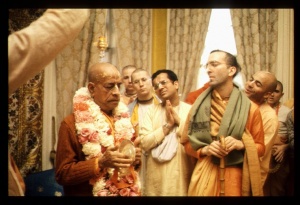CC Madhya 15.154 (1975): Difference between revisions
(Vanibot #0027: CCMirror - Mirror CC's 1996 edition to form a basis for 1975) |
(Vanibot #0020: VersionCompareLinker - added a link to the Version Compare feature) |
||
| Line 2: | Line 2: | ||
<div style="float:left">'''[[Sri Caitanya-caritamrta (1975)|Śrī Caitanya-caritāmṛta (1975)]] - [[CC Madhya (1975)|Madhya-līlā]] - [[CC Madhya 15 (1975)|Chapter 15: The Lord Accepts Prasādam at the House of Sārvabhauma Bhaṭṭācārya]]'''</div> | <div style="float:left">'''[[Sri Caitanya-caritamrta (1975)|Śrī Caitanya-caritāmṛta (1975)]] - [[CC Madhya (1975)|Madhya-līlā]] - [[CC Madhya 15 (1975)|Chapter 15: The Lord Accepts Prasādam at the House of Sārvabhauma Bhaṭṭācārya]]'''</div> | ||
<div style="float:right">[[File:Go-previous.png|link=CC Madhya 15.153 (1975)|Madhya-līlā 15.153]] '''[[CC Madhya 15.153 (1975)|Madhya-līlā 15.153]] - [[CC Madhya 15.155 (1975)|Madhya-līlā 15.155]]''' [[File:Go-next.png|link=CC Madhya 15.155 (1975)|Madhya-līlā 15.155]]</div> | <div style="float:right">[[File:Go-previous.png|link=CC Madhya 15.153 (1975)|Madhya-līlā 15.153]] '''[[CC Madhya 15.153 (1975)|Madhya-līlā 15.153]] - [[CC Madhya 15.155 (1975)|Madhya-līlā 15.155]]''' [[File:Go-next.png|link=CC Madhya 15.155 (1975)|Madhya-līlā 15.155]]</div> | ||
{{CompareVersions|CC|Madhya 15.154|CC 1975|CC 1996}} | |||
{{RandomImage}} | {{RandomImage}} | ||
==== TEXT 154 ==== | ==== TEXT 154 ==== | ||
| Line 25: | Line 24: | ||
<div class="translation"> | <div class="translation"> | ||
" 'The servitor must have love and affection for the lotus feet of the Lord exactly like this. Even if the Lord wants separation, a devotee cannot abandon the shelter of His lotus feet. | |||
</div> | </div> | ||
| Line 32: | Line 31: | ||
<div class="purport"> | <div class="purport"> | ||
The word prabhu, or master, indicates that the Lord is to be continuously served by His devotee. The original prabhu is the Lord, Śrī Kṛṣṇa. Nonetheless, there are many devotees attached to Lord Rāmacandra, and Murāri Gupta is a vivid example of such unalloyed devotion. He never agreed to give up Lord | The word prabhu, or master, indicates that the Lord is to be continuously served by His devotee. The original prabhu is the Lord, Śrī Kṛṣṇa. Nonetheless, there are many devotees attached to Lord Rāmacandra, and Murāri Gupta is a vivid example of such unalloyed devotion. He never agreed to give up Lord Rāmacandra's worship, not even upon Śrī Caitanya Mahāprabhu's request. Such is the chastity of devotional service, as stated in the Antya-līlā of Caitanya-caritāmṛta (4.46-47): | ||
:sei bhakta dhanya, ye nā chāḍe prabhura caraṇa | :sei bhakta dhanya, ye nā chāḍe prabhura caraṇa | ||
:sei prabhu dhanya, ye nā chāḍe nija-jana | :sei prabhu dhanya, ye nā chāḍe nija-jana | ||
:durdaive sevaka yadi yāya anya sthāne | :durdaive sevaka yadi yāya anya sthāne | ||
:sei ṭhākura dhanya tāre cule | :sei ṭhākura dhanya tāre cule dhari' āne | ||
In a firm relationship with the Lord, the devotee does not give up the Lord's service under any circumstance. As far as the Lord Himself is concerned, if the devotee chooses to leave, the Lord brings him back again, dragging him by the hair. | |||
In a firm relationship with the Lord, the devotee does not give up the | |||
</div> | </div> | ||
Latest revision as of 08:54, 27 January 2020

A.C. Bhaktivedanta Swami Prabhupada
TEXT 154
- ei-mata sevakera prīti cāhi prabhu-pāya
- prabhu chāḍāileha, pada chāḍāna nā yāya
SYNONYMS
ei-mata—like this; sevakera—of the servitor; prīti—love; cāhi—is wanted; prabhu-pāya—unto the lotus feet of the Lord; prabhu chāḍāileha—even though the Lord causes separation; pada—the lotus feet of the Lord; chāḍāna nā yāya—cannot be given up.
TRANSLATION
" 'The servitor must have love and affection for the lotus feet of the Lord exactly like this. Even if the Lord wants separation, a devotee cannot abandon the shelter of His lotus feet.
PURPORT
The word prabhu, or master, indicates that the Lord is to be continuously served by His devotee. The original prabhu is the Lord, Śrī Kṛṣṇa. Nonetheless, there are many devotees attached to Lord Rāmacandra, and Murāri Gupta is a vivid example of such unalloyed devotion. He never agreed to give up Lord Rāmacandra's worship, not even upon Śrī Caitanya Mahāprabhu's request. Such is the chastity of devotional service, as stated in the Antya-līlā of Caitanya-caritāmṛta (4.46-47):
- sei bhakta dhanya, ye nā chāḍe prabhura caraṇa
- sei prabhu dhanya, ye nā chāḍe nija-jana
- durdaive sevaka yadi yāya anya sthāne
- sei ṭhākura dhanya tāre cule dhari' āne
In a firm relationship with the Lord, the devotee does not give up the Lord's service under any circumstance. As far as the Lord Himself is concerned, if the devotee chooses to leave, the Lord brings him back again, dragging him by the hair.